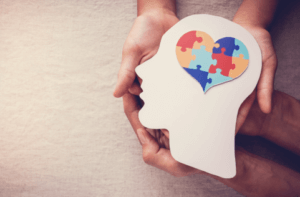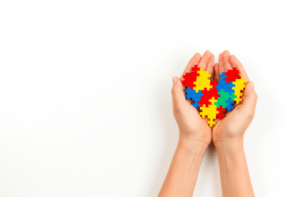Is it the norm for you, your child, or someone you know to experience sensory challenges with food, forget to eat, or take a long time to eat due to getting easily distracted?
While this doesn’t necessarily mean there’s an eating disorder at play, it could mean something else that would be important to recognize: they may be a neurodiverse individual.

What is Neurodiversity?
Neurodiversity is both a scientific fact from brain imaging and a social justice movement.
Child Mind Institute summarizes neurodiversity as the following:
“...it means that there are many differences in the way people’s brains work. There’s no “correct” or “incorrect” way. Instead, there is a wide range of ways that people perceive and respond to the world, and these differences should be embraced”.
The word neurodiversity is often used in the context of autism spectrum disorder (ASD), as well as other neurological or developmental conditions such as attention-deficit/hyperactivity disorder (ADHD) or learning disabilities.
Judy Singer, an Australian sociologist, coined the term neurodiversity in the 1990s to fight stigma against people with autism, ADHD and learning disorders like dyslexia. The vision is to promote equality and inclusion of "neurological minorities". Neurodiversity has become a self-advocacy social justice movement, and many adolescents especially are increasingly identifying as neurodiverse instead of neurotypical.
Neurodiversity is something that must be honored and acknowledged as a legitimate thing in our world and the human experience, especially given the fact that many individuals living with ADHD, autism, and learning disabilities have never been diagnosed.
There is also a connection between neurodiversity and eating disorders - let's dive in more below.
3 Facts on Neurodiversity and Eating Disorders
1) Eating disorders commonly occur in neurodivergent individuals
There can be so much pressure on neurodivergent people to just “eat normally”. However, it should be recognized that someone with neurodivergence can have extra struggles with food not related to the etiology of an eating disorder, and should not be expected to have a “normal” relationship with food.
The dietitians here at NourishRX want to help empower those with neurodivergence to decrease anxiety around food and support optimal health in a way that is best for them, which doesn’t automatically equate to expecting someone to eat a massive variety of foods or to perfectly remember to eat everyday.
2) Autistic people are thought to represent up to 37% of those with anorexia nervosa (AN).
However, this may likely be an underestimate given that autism is oftentimes un/misdiagnosed in women, trans and non-binary folk, as well as ethnic or racial minorities. Un/misdiagnoses of neurodivergent people can have a variety of negative consequences on mental health.
While most of the emphasis is placed on the connection between autism and anorexia nervosa (AN) or avoidant/restrictive food intake disorder (ARFID), autistic traits have been correlated with all eating disorder subtypes (e.g., bulimia nervosa, other specified feeding or eating disorder, binge eating disorder).”
3) ADHDers are at a greater risk of developing an eating disorder.
It is estimated that ADHDers are 3 to 6 times more at risk of struggling with an eating disorder. ADHD is also vastly un/misdiagnosed in women and other minority groups.
While most of the emphasis has been placed on the connection between ADHD and bulimia nervosa (BN) or binge eating disorder (BED), ADHD has been correlated with all eating disorder subtypes. In addition, it is worth noting that autism and ADHD often co-occur. This means that the connections between autism, ADHD, and eating disorders are complex and not “clear cut”.
If you are interested in learning more about this topic, we recommend checking out Eating Disorders Neurodiversity Australia.

INTERESTED IN WORKING WITH AN ONLINE NUTRITIONIST IN MASSACHUSETTS?
At NourishRX, we understand that finding the right treatment for an eating disorder can be overwhelming. We are here to provide the right support, nutrition education, and guidance you need to reach your goals. If you're concerned about how to take a step forward with your eating disorder recovery, please don't hesitate to reach out. We offer virtual nutrition counseling for those in Massachusetts and beyond. If you're interested in working with us:
- Book an Appointment
- Learn More About Us
- Begin Your Recovery Journey!
OTHER NUTRITION SERVICES OFFERED AT NOURISHRX
At NourishRX, we offer a variety of nutrition counseling services tailored to fit your individual needs. Our team of registered dietitians knows that no two individuals have the same nutritional needs and that each person's journey to recovery is unique. This is why we offer Nutrition Counseling, Intuitive Eating Support, Support for Parents and Caregivers, and Meal Planning. If you are wanting more information we also offer a Questions and Clarity Call to answer any questions you may have before taking the next step in your journey. No matter what your nutritional needs are, our team is here to help.
Comments Off on 3 Facts on Neurodiversity and Eating Disorders